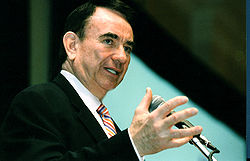Tommy Thompson
After his time in the Bush Administration, Thompson became a partner in the law-firm Akin Gump and Independent Chairman of Deloitte's Center for Health Solutions.
[2][3] Thompson was a candidate for President of the United States, running in the 2008 Republican Party presidential primaries, but withdrew from the race before voting began.
[6][7] His mother, Julie (née Dutton), was a teacher, and his father, Allan Thompson, owned and ran a gas station and country grocery store.
[33] Thompson won election to a fourth term defeating Democrat Ed Garvey, a Wisconsin Deputy Attorney General, 60%–39%.
[36][37] In 1990 Thompson pushed for the creation of the country's first parental school-choice program, which provided Milwaukee families with a voucher to send children to the private or public school of their choice.
[47] Thompson was promoting the "Midwest Rail Initiative" in his capacity as Amtrak's chairman, which included a proposal for a line connecting these cities.
[16] As governor, Thompson took major steps to transfer decision-making power from elected constitutional officers and independent agencies to his political appointees.
[16] Thompson also insisted on keeping Good Friday as a half-holiday for state workers, "despite a clear ruling" from the Seventh Circuit, earning a rebuke from the court.
His support for legislation in Wisconsin restricting abortions led Planned Parenthood, NARAL, and other pro-choice groups to oppose his nomination to head HHS.
[16] However, Thompson was forced to fight off perceptions of being someone to "bluster through a speech, turn bombastic during public statements", and have difficulty thinking on his feet.
While Secretary, he launched initiatives to increase funding for the National Institutes of Health,[61] reorganize the Centers for Medicare & Medicaid Services to encourage greater responsiveness and efficiency, and clear the backlog of waivers and state plan amendments.
[62] In the aftermath of 9/11, he also worked on strengthening the nation's preparedness for a bio-terrorism attack, by stockpiling smallpox vaccines and investing heavily in state and local public health infrastructure.
[68] In her Senate campaign, Rep. Tammy Baldwin (D-WI) said in 2012 that Thompson was responsible for forbidding Medicare to negotiate drug prices, a statement that Politifact rated as "True.
Thompson was given poor marks for seeming "utterly overtaken by events" and issuing "early statements that the government was prepared to deal with any biological emergency [that] never squared with the facts".
[73] At a White House briefing following the first anthrax death of the scare, Thompson made a statement to the press that "would be cited for years afterward as a historic blunder in crisis communication".
Keusch relayed to one of those rejected, Nobel laureate Torsten Wiesel, that he was pushed aside for having "signed too many full-page letters in The New York Times critical of President Bush.
"[79] This incident was cited by the advocacy group Union of Concerned Scientists as part of a report detailing their allegations of a "politicization of science" under President George W. Bush's administration.
[80][81] Thompson resigned on December 3, 2004, in a press conference at which he issued warnings over the dangers of avian flu and the poisoning of U.S. food supplies by terrorists.
[86] A number of those companies and organizations (as of 2012), "he helps oversee have faced an array of troubles, including claims of making faulty and dangerous medical implants, failing grades from a corporate watchdog and allegations of misleading investors."
[85] Soon after leaving office, Thompson began publicly proposing policy solutions for a variety of programs that he had overseen as HHS Secretary.
[88] However, critics claimed many changes would benefit companies Thompson owned or had a financial stake in (including Centene and the Deloitte Center for Health Solutions).
[88] These included transferring some Medicaid beneficiaries from federal to state responsibility and requiring digitization of medical records, which would directly benefit those companies.
You've been outstanding business people and I compliment you for that.Thompson was courting public support, not trying to alienate people—which means he somehow believed that repeating an age-old stereotype about Jews and money would please his Jewish listeners!
There could be no more vivid illustration of how deeply ingrained these stereotypes have become.In April 2007, Thompson was compelled to apologize for remarks he made about Jews and Israel during an address to an assembled crowd of Jewish social activists in Washington, D.C.[96] On April 16, 2007, appearing before a conference organized by the Religious Action Center of Reform Judaism, Thompson referenced his lucrative transition from public service to the private sector[97][98] and invoked old, slanderous stereotypes linking Judaism with finance.
His opponents in the primary had included Eric Hovde (a millionaire hedge fund manager), Mark Neumann (a former congressman), and Jeff Fitzgerald (speaker of the Wisconsin State Assembly).
[111] During the primary, attention was raised to the fact that in 2008 Thompson had given campaign contributions to two Democrats[112] – $250 to Michigan U.S. senator Carl Levin and $100 to Bev Perdue, who was running for governor of North Carolina.
[114] Ahead of the general election, ALEC member the American Chemistry Council spent nearly $650,000 in support of Thompson's campaign in the latter part of 2012.
[115] In early July, Thompson, endorsed Donald Trump (the party's presumptive nominee)[116] and served as a delegate to the 2016 Republican National Convention.
[119] In October 2022, Thompson joined the Council for Responsible Social Media project launched by Issue One to address the negative mental, civic, and public health impacts of social media in the United States co-chaired by former House Democratic Caucus Leader Dick Gephardt and former Massachusetts Lieutenant Governor Kerry Healey.
[125] In what was seen as a flawed candidate search, complicated by the COVID-19 pandemic in Wisconsin, the board initially was poised to offer the position to University of Alaska System President Jim Johnsen.




